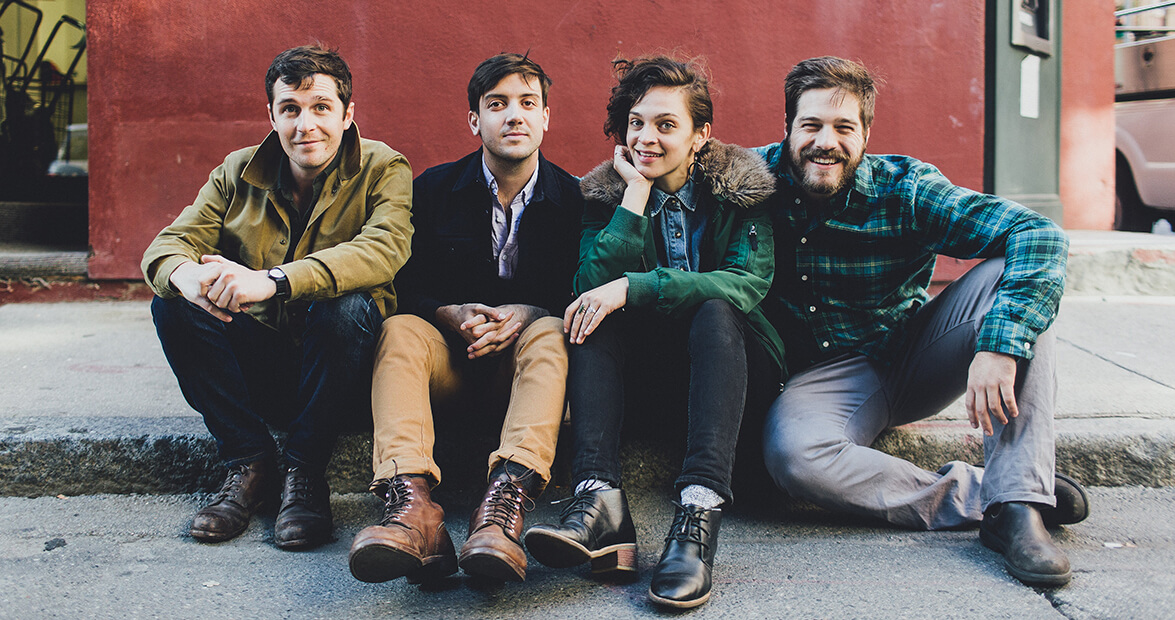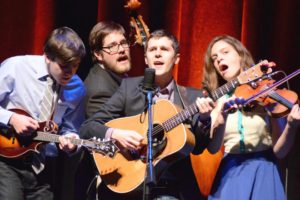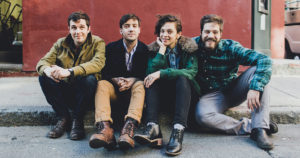Mipso are the real deal when it comes to Southern Bluegrass, Folk, and Country music. The quartet of college friends grew up in North Carolina studied the local roots music, and immersed themselves in it… Eventually making records that shied away from conventional modern songwriting, instead focusing on telling stories with a unmistakable, and infectious, vocal harmonization. The group’s third record Coming Down the Mountain, showcases Mipso’s growth from string band, to something a bit more contemporary without throwing away the grit. The record is fabulous and so is the band. B-Sides was afforded some time to speak with Mipso guitarist and vocalist, Joseph Terrell, about the new record, the strict Bluegrass scene in Japan, and that one time they were in the Macy’s Day Thanksgiving Parade.
How did Mipso form?
Joseph – “We pretty much formed as friends before we were bandmates, we met at the University of North Carolina at Chapel Hill. We were just students studying different things, and just all happened to be interested in exploring the more traditional side of the local music at the same time. We figured the best way to do that was to just start playing songs. The best way we thought to do that was to just jam, and we eventually were asked to play some barbecue and fundraiser gigs. Before we knew it we had written some songs. It was kind of on accident.”
Sounds like you were having fun with people that you like?
Joseph – “It was, it also had everything to do with the music going on around the area. We had a lot of people to look up to and a lot of concerts to go to that we loved in the Chapel Hill, Raleigh, Durham area in what is called the Triangle. It was just fertile ground for collaboration. It’s not traditional music per se, it’s like a revitalized version, inspired by some roots music of the Southeast.”
What draws you and the band to want to keep playing Bluegrass and Folk Music?
Joseph – “The sounds draw a lot of authenticity and honesty, but on the other side of that coin, you can just as easily get real stale sounding junk. We try not to be rigidly in any sort of genre. But it seems honest for us to play this type of music. On the one hand, it’s really what we are interested in and wanted to learn when we started playing together. On the other hand, it was in the air around us when we were growing up. I come from a family that gets together and plays bluegrass around Thanksgiving and Christmas. Some of my favorite uncles that I hung out with growing up were great banjo players. For me, it was a return to my roots; in my teenage years I played in a lot of garage rock bands thinking that was way cooler. And I sort of turned around and decided to go to college in my hometown. It was a process for us to dig down into the nitty gritty of where we come from and seeing what there is to like.”
I come from a similar musical family that found a certain sound in a Pentecostal Church.
Joseph – “It’s such a cool tradition, and religion is certainly wrapped up in it. For all the good and bad, I think that the cool part of it is that it’s not sanitized and safe, and… homogenized like a lot of country music that you hear on the radio. There is just some weird, jagged shit from way back that rears its head. That stuff is really cool and sometimes it’s messed up.
“I think the word “honest” is right, maybe it sounds weird that a kid born in 1990 can sing a song from 1890, but it takes a lot of listening and if you can wrap your head around where the song comes from, it can be done with honesty.”
Your new record Coming Down the Mountainis tremendous, what was the songwriting process like for that record?
Joseph – “Our first two records, Dark Holler Pop and Old Time Reverie, were made because we deliberately wanted to make string band records. I think the limitations that those records provided were what drew us to them. We really wanted to make a string/pop record but still have great harmonies and melodies without using electric guitars or drums or anything. But at the same time, the mission of our band, of our four personalities, was to make what we felt was honest to make and to combine our voices to what felt natural and exciting to us. When it came time to make the new record, we had enough time to get together, take a step back, share what we were all listening to and share snippets of songs we had been working on. It turns out we felt it would be more honest and fun if we were to try expanding the instrumentation a little bit. I’m glad we did, it felt like us, which is the simplest way to put it. There is a big difference between being 21 and being 27. I feel like if our records didn’t sound different we would be doing something wrong.
“When we were starting out, there was such a great music community around us including Chatham County Line, and Megafaun. A bunch of great bands that were pulling from the well of the great music that came from where we were at the time. I think that community and circle of people grew since we’ve been here to include more Americana music which is more in the Durham area. A couple of us have moved outside of the Triangle at this point, so when we were making Coming Down the Mountain we decided to make a fun record that we could play live. We had a ton of friends from the area join us on different instruments, it felt kind of like a party, really comfortable to make in a good way.”
The harmonies on the record sound so natural, I kept thinking of Fleetwood Mac, with such a distinct sound. How do you translate that sound to a live setting?
Joseph – “The way we learned to sing together was to stand in a circle and practice and we have been doing that for years now. If it sounds good, it just comes from those years of comfort, and really the stage is where it sounds the best and represents our three voices. The hard part is making it sound good in the studio. Most of the time in the studio we are isolated, sometimes not in the same room, I feel like if it comes across as good on the record, I’m stoked about that because, to me, most of the recorded harmonies pale in comparison to what it sounds like when we stand in a circle.
“I’m glad you mentioned Fleetwood Mac. I think we have certain bands in our heads as models of, not what to sound like, but how to make the personalities in a band interact in such a way that is greater than the sum of the parts. I think that’s why a band is fascinating to me is, it’s this team with synergy that elevates the music. When it’s good, it’s great… when it’s not, it’s terrible.”
I was speaking with a musician a while back about how interesting it is when musicians can take the same instruments, guitar and drums, and make sounds that are completely different from one another.
Joseph – “From a criticism perspective. It’s sort of a bummer when the point of talking about music is to break it down into smaller and smaller genres. But, if you think of it as an opportunity to draw a circle around musicians who use the same ingredients, but come up with something totally different, it’s pretty useful. There are a ton of bands that we look up to that are similar to us. Hopefully our ingredients combined are a little bit different.”
I found it very interesting that the band made a movie called Made In Japan about a tour you did there. How did you end up making the movie, and what was the scene like in Japan?
Joseph – “It was almost four years ago now. We were in college and touring around locally. We played from DC to Atlanta, mostly Southeast stuff. We graduated and, long story short, my bandmate Jacob who plays mandolin and guitar, did a big project in school on how, and why, bluegrass music spread through Japan after WWII, like Levi’s and baseball, it has a big following. Through his research he made some connections. We were invited to a couple of festivals, and we strung together some gigs of mostly university towns. Most of those towns tend to have bluegrass clubs where people can play music. I think we were a much better band now than we were back then, but I think because we were from the South and we would say stuff like, “how y’all doin’”, they loved it and would fall out of their chairs.
“And there are so many good musicians over there, many with a reverence for traditional, original bluegrass and country, but also many who were just good musicians period, and they were so much fun to play with. I now play a guitar that was made by a great Japanese Luthier and Jacob plays a mandolin made by a great Japanese luthier. Because we just have a bunch of buddies over there and we have kept up. Many travel to the big Bluegrass Festival and Conference, the IBMA.
“It’s the weirdest scene over there. A lot of the musicians are pretty strict, almost preservationists. They want to play the songs note for note, like Earl Scruggs did in 1950. These guys will wear suits and Stetsons, and play a perfect Earl Scruggs banjo break. It’s pretty wild.”
What do you think of when you hear the term Americana?
Joseph – “Honestly, I think of old gas station signs and American flags at some vintage shop. It seems more of a marketing term than a reflection of a genre. I think it’s useful. I think the problem is you can be successful for what used to be called country music. Lucinda Williams was kind of the beginning of Americana music, but now it’s got an Alt-Country feel to it and anything rootsy is thrown in there, it’s such a nebulous term. I’m glad to be in that group with so many great musicians making such great music. It’s a cool scene to be a part of.
“I’m pretty cynical about the pop-country thing because it’s pandering to pre-conceived ideas to what it means to be a rural American, like trucks and cut-off jeans…..and beer. I love country music. There are still pockets of people, even in that pop-country world, that write and perform their craft is a super cool way. Kind of like crafting a surprise punchline at the end of a chorus. I love Brad Paisley, he’s super talented, and I love people that can rip on a Telecaster.
“I totally get what you are getting at though with the Americana thing, maybe Americana is not a specific word, but I can’t think of anything better, so I guess we will run with it. There is definitely good stuff going on in that genre, whatever it may be.”
Mipso played on the 2015 Kentucky Fried Chicken Macy’s Day Thanksgiving Parade float. How surreal was it to play during the parade?
Joseph – “That was a good way to ask that question, because I would have said it was surreal anyway. We were so shocked that we got asked and hemmed and hawed about it for some time. We ended up deciding that it would be the weirdest Thanksgiving of our lives. We were kind of on the outside looking in on commercial pop stardom. We laughed our asses off and waved at people. It was weird and fun.
“I can see why someone would think it was dumb because that is not the reason we make music. We have been touring in a grass-roots way, and hitting the pavement for years, that is the way to make music, not being sponsored by big corporations, so it felt a little unusual. But I think we did it because we wanted to have fun, so we said yes to a very weird experience.
“It’s funny, we were on the float for like an hour or so going all the way down the street. You get off the float right after you’re done passing by the Macy’s building. They scoot you into a black car that takes you directly to the airport. We got off the float at 12:30, and home by 3:30 having Thanksgiving dinner with our families.”
What is a record that you own that might surprise your fans that influenced you as an artist’s?
Joseph – “I’m standing in front of my record collection right now actually. On the turntable right now is Joni Mitchell’s Hejira, I love Paul Simon and James Taylor and I love Mark Knopfler, I think he is great. I’ve internalized a lot of old bluegrass, and new bluegrass from the 70s like New Grass Revival and Tony Rice and things like that. But also I love the singer-songwriters from the 70s. Randy Newman is one of my favorites.There is a lot of new stuff coming up now. I think Jeff Tweedy is a genius.”
What was the first record that you ever bought?
Joseph – “I remember the first album I was ever given and it was Tubthumping by Chumbawamba, Christmas 1999. Growing up, my favorite bands were Blink 182 and Phish.”
What’s next for Mipso?
Joseph – “We’ve already finished the next record. We spent two weeks in January tracking it. We’re not going to rest and wait around for the next cycle. We’re kind of ready to make something new. We are touring California coming up and then we’re doing a Deep South tour.”




